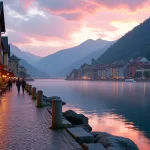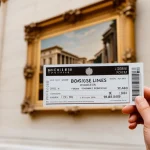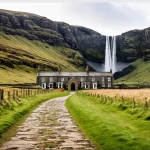Overview of Traditional UK Festivals
The cultural landscape of the UK is richly coloured with a multitude of traditional festivals that echo the country’s diverse heritage and vibrant communities. These festivals are more than just celebrations; they are pivotal cultural events that bring people together, reinforcing communal bonds and cultural identity. Throughout the year, the UK hosts a plethora of festivals, each with its own unique charm and cultural significance.
Traditional UK festivals provide a travel guide into the heart of British culture, showcasing historical traditions, music, arts, and local flavours. From the lively streets filled with the sounds of bagpipes during Burns Night in Scotland, to the whimsical Maypole dances in England, these festivals offer a kaleidoscope of experiences for both locals and visitors. They are essential in understanding the cultural nuances and practices that define the UK’s dynamic social tapestry.
Additional reading : Avoid queues and enhance your experience with borghese gallery tickets
These events not only highlight the diversity found across the British Isles but also underscore the shared histories and customs that have been passed down through generations. By participating in these festivals, travellers can immerse themselves in the local culture and leave with a deeper appreciation of the UK’s many unique traditions.
Major Traditional UK Festivals
Exploring major UK festivals offers insights into the vibrant cultural tapestry that defines the nation. Each festival embodies distinct highlights and offers unique experiences, drawing both locals and visitors into its celebrations.
Topic to read : How to Discover the UK’s Most Beautiful Coastal Walks?
Notting Hill Carnival
The Notting Hill Carnival transforms London’s streets into a parade of colour and music, celebrating Caribbean culture. Held annually in August, it is renowned for its lively atmosphere, parades, and acts as a platform for cultural expression through dance, food, and music. Carnival-goers can delight in steel bands, vibrant costumes, and varied culinary stalls, creating an immersive experience of Caribbean heritage.
Edinburgh Festival Fringe
Known as the world’s largest arts festival, the Edinburgh Festival Fringe offers an eclectic mix of theatre, comedy, and music. Every August, performers from across the globe gather in Scotland’s capital, turning it into a haven for artistic exploration. Visitors can enjoy an array of shows, from street performances to intimate theatre productions, making it a must-visit for those seeking a celebration of creativity and diversity.
Glastonbury Festival
The Glastonbury Festival is a highlight in the music world, hosting five days of contemporary performing arts in Somerset. It’s celebrated for its monumental global music acts and arts installations. Beyond music, Glastonbury invites attendees to explore its varied zones, offering theatre, circus, and diverse culinary delights from across the globe, providing a holistic festival experience that transcends music alone.
Practical Tips for Festival Attendance
Attending traditional UK festivals offers a wonderful opportunity to delve into local culture, but it’s essential to approach it prepared. Here are some festival travel tips to ensure a pleasant experience.
Plan Your Visit: It’s crucial to align your travel plans with festival dates to experience these cultural events. Most festivals have designated weeks or weekends, and understanding these timelines helps in structuring your journey. It’s advisable to book accommodations in advance since nearby hotels and hostels can fill up quickly.
Transportation and Accessibility: Determine available options for reaching the festival venues. Many events, especially those in rural areas, may require a combination of public transportation and local shuttle services. Familiarising yourself with transport routes will ease your travel.
Essentials to Pack: For a comfortable experience, pack for varying weather conditions, as UK weather can be unpredictable. Consider essentials like waterproof clothing, comfortable footwear, and a hat for sun or rain protection. Travellers should also bring items like a portable charger and cash, as some vendors may not accept card payments.
Safety and Participation: Pay attention to traveler safety tips. Stay hydrated, keep an eye on your belongings, and be aware of your surroundings. Many festivals uphold cultural traditions, so being respectful and observing local customs is key to a positive experience for both visitors and hosts.
Cultural Practices and Local Customs
Attending traditional UK festivals offers a vibrant glimpse into the country’s rich cultural practices and local customs. These events are steeped in history, often featuring parades, dances, and other performative acts that embody the essence of the community’s heritage. Understanding some of these practices enhances appreciation and participation for both locals and visitors alike.
Many festivals involve specific cultural traditions, such as the lively Maypole dances in England or the exuberant Highland games in Scotland. Such traditions are integral to the festival’s atmosphere, and they allow participants to engage with the locality’s historic roots. It is beneficial for visitors to familiarize themselves with these practices to immerse themselves seamlessly into the experience.
When attending these events, it is crucial to observe local customs and festival etiquette. This includes being respectful of cultural symbolism and participating in traditional acts, such as joining in folk dances or observing specific rituals, when invited. Visitors should also be mindful of personal space and conduct themselves politely, creating a harmonious interaction between travelers and hosts.
To participate respectfully in cultural events, it is advised to do some research beforehand, perhaps consulting local guides or online resources to understand the dos and don’ts associated with each festival. Respecting cultural boundaries and actively listening to locals can contribute significantly to a more enriching and enjoyable festival experience.
Food and Drink at UK Festivals
Exploring traditional UK festivals is not complete without indulging in the vibrant array of festival food and local cuisine. Each event offers a unique culinary experience, reflecting the regional tastes and culinary traditions that define the UK’s diverse heritage. From the hearty pies and sausages at winter fairs to the summery Eton mess at country fêtes, there’s something for every palate.
At festivals like the Notting Hill Carnival, visitors can savour the rich flavours of Caribbean jerk chicken, while the Glastonbury Festival boasts an eclectic mix of international dishes alongside classic British fare. Local cuisine at these festivals not only provides nourishment but also offers insight into the region’s cultural tapestry. Vendors often specialize in regional delicacies, providing an authentic taste of the area.
When navigating food options, it’s important to consider dietary restrictions. Many festivals now cater to a range of diets, including vegetarian, vegan, and gluten-free options. Look for designated stalls or ask vendors for accommodations to ensure you have an enjoyable culinary journey. Embrace the opportunity to try new foods, and don’t shy away from asking locals for their recommendations.
Attire and What to Wear
Choosing the right festival attire is crucial to enjoying traditional UK festivals no matter the weather. With the UK’s famously unpredictable climate, it’s wise to prepare for a variety of conditions. Clothing recommendations should focus on layering, allowing festival-goers to adapt to changing temperatures throughout the day. Waterproof jackets and sturdy footwear are must-haves, especially for outdoor events, ensuring comfort regardless of rain or sunshine.
For those seeking to enhance their festival experience, embracing cultural attire relevant to specific events can not only add to the festive spirit but also facilitate greater engagement with the local customs. For instance, tartan attire might be appreciated during Glasgow’s Celtic Connections, while embracing Caribbean-inspired clothing is a fun way to participate in the vibrant Notting Hill Carnival.
When it comes to comfort and practicality, lightweight, breathable fabrics are advisable for daytime events, paired with warmer layers for cooler evenings. Accessories like hats, sunglasses, and sunscreen play important roles in protecting against the elements. Pay attention to any festival-specific dress codes or restrictions to ensure a smooth, enjoyable, and immersive experience.
Traveler Testimonials and Personal Experiences
Engaging with traditional UK festivals through the lens of personal narratives provides a dynamic view of their cultural significance. These festival experiences are rich with tales of community and connection, shedding light on how festivals not only entertain but also bring people together.
Travelers often share heartwarming stories of engaging in local customs, such as participating in the vibrant dances of Notting Hill Carnival or sharing a hearty meal with locals at Glastonbury. Such moments highlight the deep community engagement fostered by these events. Attendees fondly recall the welcoming nature of small towns during festivals, where strangers are transformed into friends over shared traditions.
One traveler recounted their enchantment with the spontaneous comedies seen at the Edinburgh Festival Fringe, praising the unique experiences that each performance brings. These narratives often capture the essence of being swept into lively celebrations, from awe-inspiring parades to intimate performances.
Many visitors express how these festivals allow them to break out of their daily routine, stepping into a world of tradition and festivity. This genuine cultural exchange makes lasting impressions, often leaving festival-goers eager to return year after year. Through these personal glimpses into traveler stories, the significance of these festivals is not only understood but felt deeply.





